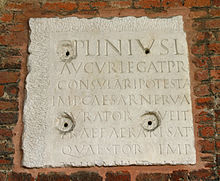
Back Kiçik Plini xristianlar haqqında Azerbaijani Plinio el Joven y los cristianos Spanish نامه پلینی جوان در مورد مسیحیان Persian Tulisan Plinius yang Muda tentang Kristen ID Briefwisseling tussen Plinius en Trajanus over christenen Dutch Plínio, o jovem, sobre os Cristãos Portuguese

Pliny the Younger, the Roman governor of Bithynia and Pontus (now in modern Turkey), wrote a letter to Emperor Trajan around AD 110 and asked for counsel on dealing with the early Christian community. The letter (Epistulae X.96) details an account of how Pliny conducted trials of suspected Christians who appeared before him as a result of anonymous accusations and asks for the Emperor's guidance on how they should be treated.[1][2]
Neither Pliny nor Trajan mention the crime that Christians were supposed to have committed, except for being a Christian; and other historical sources do not provide a simple answer to what that crime could be, but most likely due to the stubborn refusal of Christians to worship Roman gods; making them appear as objecting to Roman rule.[3][4]
Pliny states that he gives Christians multiple chances to affirm they are innocent and if they refuse three times, they are executed. Pliny states that his investigations have revealed nothing on the Christians' part but harmless practices and "depraved, excessive superstition." However, Pliny seems concerned about the rapid spread of their practices and views Christian gatherings as a potential starting point for sedition.[4]
The letter is the first pagan account to refer to Christianity, providing key information on early Christian beliefs and practices and how these were viewed and dealt with by the Romans.[2][5][6] The letter and Trajan's reply indicate that at the time of its writing there was no systematic and official persecution of Christians in the Roman Empire.[7][8] There was persecution of Christians before this but only on a local basis, like the Neronian persecution in Rome[9][10] or the expulsion of Jewish-Christians and Jews from Rome by order of Claudius.[11] Trajan's reply also offers valuable insight into the relationship between Roman provincial governors and Emperors and indicates that at the time Christians were not sought out or tracked down by imperial orders, and that persecutions could be local and sporadic.[12]
- ^ Cite error: The named reference
Philwas invoked but never defined (see the help page). - ^ a b Cite error: The named reference
Benko5was invoked but never defined (see the help page). - ^ Cite error: The named reference
Heymanwas invoked but never defined (see the help page). - ^ a b Cite error: The named reference
EveFergusonwas invoked but never defined (see the help page). - ^ Jesus: Apocalyptic Prophet of the New Millennium by Bart D. Ehrman (Sep 23, 1999) ISBN 0195124731 Oxford UP pages 57-59
- ^ Cite error: The named reference
St. Croixwas invoked but never defined (see the help page). - ^ Cite error: The named reference
Riveswas invoked but never defined (see the help page). - ^ Cite error: The named reference
Moss145was invoked but never defined (see the help page). - ^ Tacitus, Annals, Book 15, Chapter 44
- ^ Suetonius, The Twelve Caesars, Book 6, Chapter 16
- ^ Suetonius, The Twelve Caesars, Book 5, Chapter 25
- ^ Cite error: The named reference
Barneswas invoked but never defined (see the help page).
© MMXXIII Rich X Search. We shall prevail. All rights reserved. Rich X Search